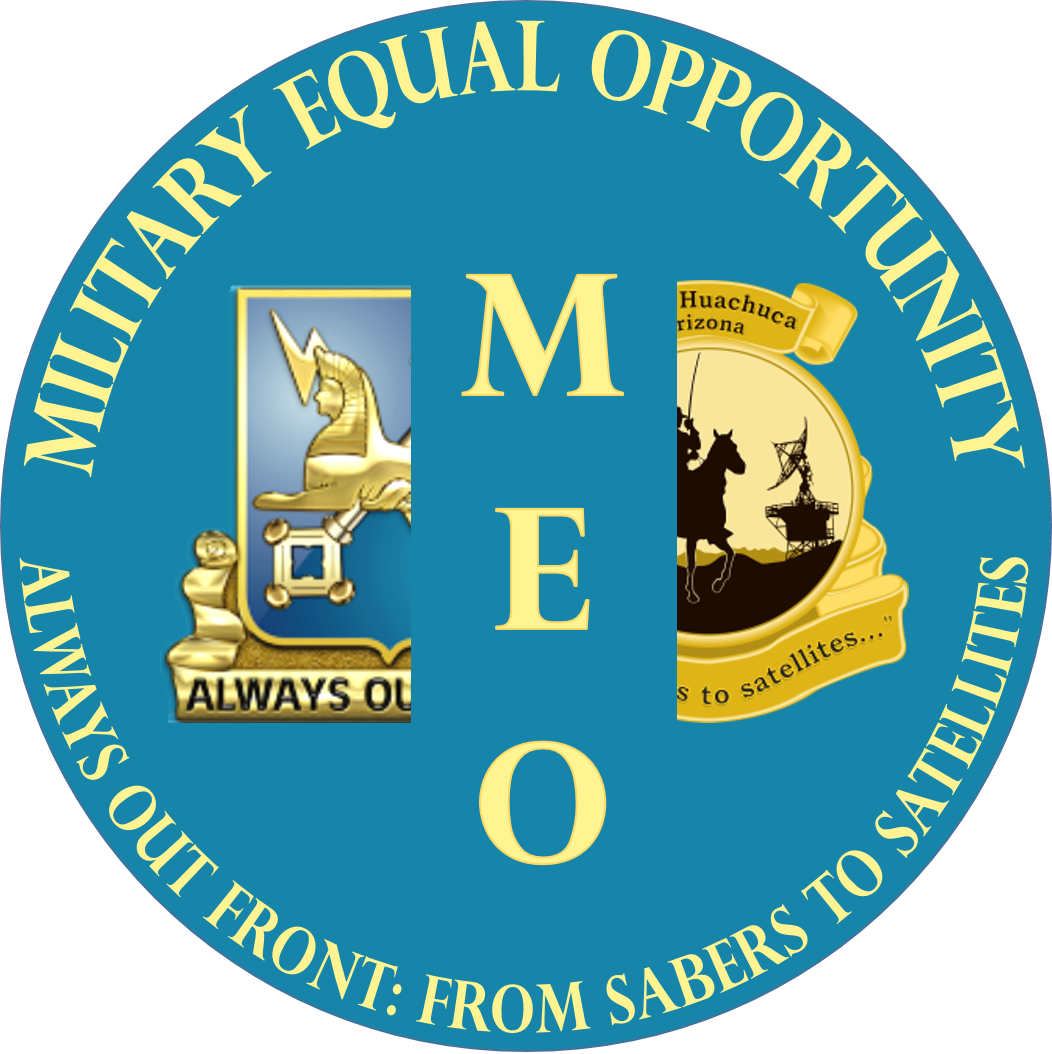Mission
The U.S.  Army will provide equal opportunity (EO) and fair treatment for military personnel and family members. The EO Program formulates, directs, and sustains a comprehensive effort to maximize human potential, and to ensure fair treatment for all based solely on merit, performance, and potential in support of readiness, and without regard to race, color, national origin, religion, sex (including pregnancy), or sexual orientation. The Intelligence Center of Excellence & Fort Huachuca Military Equal Opportunity (MEO) Office, in accordance with Army Regulation 600-20, serves as the principal advisor to the commanding general on issues to include unlawful discrimination and climate of command factors, and serves as a pivot point for compliance, training and complaint processing.
Army will provide equal opportunity (EO) and fair treatment for military personnel and family members. The EO Program formulates, directs, and sustains a comprehensive effort to maximize human potential, and to ensure fair treatment for all based solely on merit, performance, and potential in support of readiness, and without regard to race, color, national origin, religion, sex (including pregnancy), or sexual orientation. The Intelligence Center of Excellence & Fort Huachuca Military Equal Opportunity (MEO) Office, in accordance with Army Regulation 600-20, serves as the principal advisor to the commanding general on issues to include unlawful discrimination and climate of command factors, and serves as a pivot point for compliance, training and complaint processing.
The goals of the MEO program are to:
- Build and maintain a cohesive, combat-ready Army which is focused and determined to accomplish its mission;
- Provide support to military personnel and their family members, both on and off post, and within the limits of the laws of localities, states and host nation;
- Ensure MEO exists for all Soldiers;
- Ensure every Soldier is treated with dignity and respect;
- Support commanders at all levels and MEO professionals (EO program managers, EO sergeants major, EO advisors, EO specialists (RA/USAR)) and EO leaders who are responsible for the execution of MEO policies in their units, organizations and agencies.
bases of discrimination
Color Discrimination occurs when an individual is treated differently based on the lightness, darkness or toner color of the person.
Sex Discrimination occurs when an individual is deprived of an opportunity because of their sex (including pregnancy) or when decisions are made based on stereotypes and assumptions about abilities, traits or the performance of individuals on the basis of sex.
Racial Discrimination occurs when an individual is treated differently because of their racial group, racial characteristics (for example hair texture, color, facial features), or because of their relationship or association with someone of a particular race.
Religious Discrimination occurs when an individual is treated more or less favorably because of their religious beliefs or practices.
National Origin Discrimination occurs when an individual is treated less favorably because of their origin, ethnicity or accent, or because it is believed they are a particular nationality.
Sexual Orientation Discrimination occurs when an individual is treated more or less favorably because of one's emotional or physical attraction to the same and/or opposite sex (homosexuality, bisexuality or heterosexuality). Complaints may be based on actual or perceived orientation, as well as association with an individual or affinity group associated with a particular orientation.
Hazing
Hazing is a form of harassment that includes conduct through which Soldiers or DA Civilian employees (who haze Soldiers), without a proper military authority or other governmental purpose but with a nexus to military service, physically or psychologically injures or creates a risk of physical or psychological injury to Soldiers for the purpose of: initiation into, admission into, affiliation with, change in status or position within, or a condition for continued membership in any military or DA Civilian organization. Hazing can be conducted through the use of electronic devices or communication, and by other means including social media, as well as in person.
Soliciting, coercing, or knowingly permitting another to participate, solicit or coerce such conduct, may be considered hazing.
Hazing is evaluated by a "reasonable-person standard" and includes the following:
- Initiation or congratulatory act that involves physically striking Soldiers
- Pressing any object into skin, regardless of whether it pierces the skin
- Oral or written berating with the purpose of belittling or humiliating
- Encouraging Soldiers to engage in illegal, harmful, demeaning or dangerous acts
- Playing abusive or malicious tricks
- Excessive physical exercise
- Confinement to restricted areas, isolation or sleep-deprivation
- Immersion in noxious substances
- Branding, handcuffing, duct taping, tattooing, shaving, greasing or painting
- Subjecting another person to excessive or abusive use of water
- Forcing the consumption of food, alcohol, drugs or any other substance
Bullying
Bullying is the exposure of an individual or group to physical and/or emotional aggression with the intent to cause distress or harm.
Bullying may involve the singling out of an individual from his or her coworkers, or unit, for ridicule because he or she is considered different or weak.
Bullying can be conducted through the use of electronic devices or communications, and by other means including social media, as well as in person.
Bullying is evaluated by a "reasonable-person standard" and includes the following:
- Physically striking in any manner or threatening to do so
- Intimidating, teasing or taunting another person
- Oral or written berating with the purpose of belittling or humiliating
- Encouraging Soldiers to engage in illegal, harmful, demeaning or dangerous acts
- Playing abusive or malicious tricks
- Branding, handcuffing, duct taping, tattooing, shaving, greasing or painting
- Subjecting another person to excessive or abusive use of water
- Forcing the consumption of food, alcohol, drugs or any other substance
- Degrading or damaging another's property or reputation




